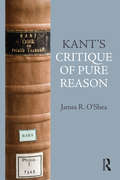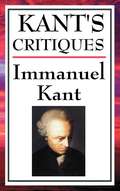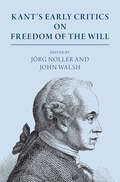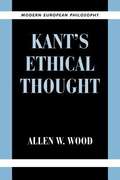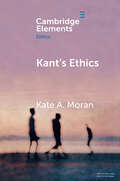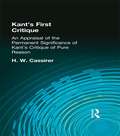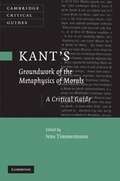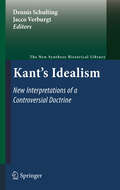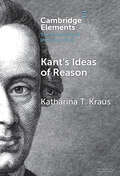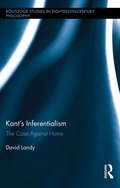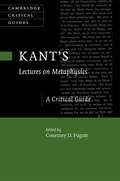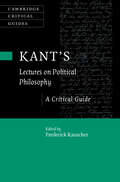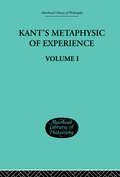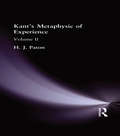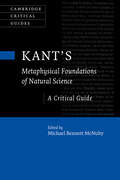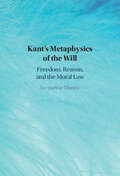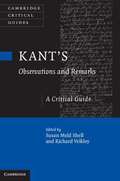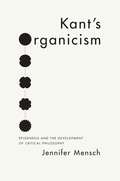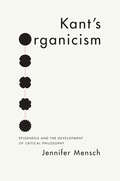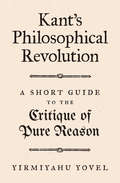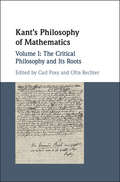- Table View
- List View
Kant's Critique of Pure Reason: An Introduction
by James O'Shea"Kant's Critique of Pure Reason" remains one of the landmark works of Western philosophy. Most philosophy students encounter it at some point in their studies but at nearly 700 pages of detailed and complex argument it is also a demanding and intimidating read. James O'Shea's short introduction to "CPR" aims to make it less so. Aimed at students coming to the book for the first time, it provides step by step analysis in clear, unambiguous prose. The conceptual problems Kant sought to resolve are outlined, and his conclusions concerning the nature of the faculty of human knowledge and possibility of metaphysics, and the arguments for those conclusions, are explored. In addition he shows how the "Critique" fits into the history of modern philosophy and how transcendental idealism affected the course of philosophy. Key concepts are explained throughout and the student is provided with an excellent route map through the various parts of the text.
Kant's Critiques
by Immanuel KantOne of the cornerstone books of Western philosophy, here is Kant's seminal treatise, where he seeks to define the nature of reason itself and builds his own unique system of philosophical thought with an approach known as transcendental idealism. He argues that human knowledge is limited by the capacity for perception.
Kant's Defense of Common Moral Experience
by Jeanine GrenbergIn this book, Jeanine Grenberg argues that everything important about Kant's moral philosophy emerges from careful reflection upon the common human moral experience of the conflict between happiness and morality. Through careful readings of both the Groundwork and the Critique of Practical Reason, Grenberg shows that Kant, typically thought to be an overly technical moral philosopher, in fact is a vigorous defender of the common person's first-personal encounter with moral demands. Grenberg uncovers a notion of phenomenological experience in Kant's account of the fact of reason, develops a new a reading of the fact, and grants a moral epistemic role for feeling in grounding Kant's a priori morality. The book thus challenges readings which attribute only a motivational role to feeling; and Fichtean readings which violate Kant's commitments to the limits of reason. This study will be valuable to students and scholars engaged in Kant studies.
Kant's Early Critics on Freedom of the Will
by John Walsh Jörg NollerThis book offers translations of early critical reactions to Kant's account of free will. Spanning the years 1784-1800, the translations make available, for the first time in English, works by little-known thinkers including Pistorius, Ulrich, Heydenreich, Creuzer and others, as well as familiar figures including Reinhold, Fichte and Schelling. Together they are a testimony to the intense debates surrounding the reception of Kant's account of free will in the 1780s and 1790s, and throw into relief the controversies concerning the coherence of Kant's concept of transcendental freedom, the possibility of reconciling freedom with determinism, the relation between free will and moral imputation, and other arguments central to Kant's view. The volume also includes a helpful introduction, a glossary of key terms and biographical details of the critics, and will provide a valuable foundation for further research on free will in post-Kantian philosophy.
Kant's Empirical Psychology
by Patrick R. FriersonThroughout his life, Kant was concerned with questions about empirical psychology. He aimed to develop an empirical account of human beings, and his lectures and writings on the topic are recognizable today as properly 'psychological' treatments of human thought and behavior. In this book Patrick R. Frierson uses close analysis of relevant texts, including unpublished lectures and notes, to study Kant's account. He shows in detail how Kant explains human action, choice, and thought in empirical terms, and how a better understanding of Kant's psychology can shed light on major concepts in his philosophy, including the moral law, moral responsibility, weakness of will, and cognitive error. Frierson also applies Kant's accounts of mental illness to contemporary philosophical issues. His book will interest students and scholars of Kant, the history of psychology, philosophy of psychology, and philosophy of action.
Kant's Ethical Thought (Modern European Philosophy Series)
by Allen W. Wood Robert B. PippinThis is a major new study of Kant's ethics that will transform the way students and scholars approach the subject in future. Allen Wood argues that Kant's ethical vision is grounded in the idea of the dignity of the rational nature of every human being. It focuses for the first time on the central role played in Kant's ethical theory by the value of rational nature as an end itself. In addition, it shows the importance of Kant's systematic theory of human nature and history, and its implications for the structure, formulation, and application of Kant's moral principles. This comprehensive study will be of critical importance to students of moral philosophy, the history of ideas, political theory, and religious studies.
Kant's Ethics (Elements in Ethics)
by Kate A. MoranThe Element provides an overview of Immanuel Kant's arguments regarding the content of the moral law (the categorical imperative), as well as an exposition of his arguments for the bindingness of the moral law for rational agents. The Element also considers common objections to Kant's ethics.
Kant's First Critique: An Appraisal of the Permanent Significance of Kant's Critique of Pure Reason
by Cassirer, H WFirst published in 2002. Routledge is an imprint of Taylor & Francis, an informa company.
Kant's Groundwork of the Metaphysics of Morals
by Jens TimmermannThe Groundwork of the Metaphysics of Morals is Kant's central contribution to moral philosophy, and has inspired controversy ever since it was first published in 1785. Kant champions the insights of 'common human understanding' against what he sees as the dangerous perversions of ethical theory. Morality is revealed to be a matter of human autonomy: Kant locates the source of the 'categorical imperative' within each and every human will. However, he also portrays everyday morality in a way that many readers find difficult to accept. The Groundwork is a short book, but its argument is dense, intricate and at times treacherous. This commentary explains Kant's arguments paragraph by paragraph, and also contains an introduction, a synopsis of the argument, six short interpretative essays on key topics of the Groundwork, and a glossary of key terms. It will be an indispensable tool for anyone wishing to study the Groundwork in detail.
Kant's Idealism
by Dennis Schulting Jacco VerburgtThis key collection of essays sheds new light on long-debated controversies surrounding Kant's doctrine of idealism and is the first book in the English language that is exclusively dedicated to the subject. Well-known Kantians Karl Ameriks and Manfred Baum present their considered views on this most topical aspect of Kant's thought. Several essays by acclaimed Kant scholars broach a vastly neglected problem in discussions of Kant's idealism, namely the relation between his conception of logic and idealism: The standard view that Kant's logic and idealism are wholly separable comes under scrutiny in these essays. A further set of articles addresses multiple facets of the notorious notion of the thing in itself, which continues to hold the attention of Kant scholars. The volume also contains an extensive discussion of the often overlooked chapter in the Critique of Pure Reason on the Transcendental Ideal. Together, the essays provide a whole new outlook on Kantian idealism. No one with a serious interest in Kant's idealism can afford to ignore this important book.
Kant's Ideas of Reason (Elements in the Philosophy of Immanuel Kant)
by Katharina T. KrausThis Element introduces Kant's ideas of reason, focussing on the ideas of theoretical reason in the study of nature. It offers a novel interpretation that shows how such ideas as the soul, the world-whole, and God provide a regulative orientation for coping with human perspectival situatedness in the world. This perspectivalist interpretation reconciles two interpretive tendencies: a realist reading, according to which ideas refer to real things independent of the human mind, and a fictionalist reading, according to which ideas are heuristic fictions without reference to anything real. The perspectivalist interpretation recognizes two functions of ideas: first, ideas outline domains of possible objects, thus presenting the human mind with contexts of intelligibility in which the cognition of objects can be meaningful at all. Second, ideas project an ultimate reality as a focus imaginarius, which serves as a normative ideal for evaluating the success of human inquiries into nature.
Kant's Inferentialism: The Case Against Hume (Routledge Studies in Eighteenth-Century Philosophy)
by David LandyKant’s Inferentialism draws on a wide range of sources to present a reading of Kant’s theory of mental representation as a direct response to the challenges issued by Hume in A Treatise of Human Nature. Kant rejects the conclusions that Hume draws on the grounds that these are predicated on Hume’s theory of mental representation, which Kant refutes by presenting objections to Hume’s treatment of representations of complex states of affairs and the nature of judgment. In its place, Kant combines an account of concepts as rules of inference with a detailed account of perception and of the self as the locus of conceptual norms to form a complete theory of human experience as an essentially rule-governed enterprise aimed at producing a representation of the world as a system of objects necessarily connected to one another via causal laws. This interpretation of the historical dialectic enriches our understanding of both Hume and Kant and brings to bear Kant’s insights into mental representation on contemporary debates in philosophy of mind. Kant’s version of inferentialism is both resistant to objections to contemporary accounts that cast these as forms of linguistic idealism, and serves as a remedy to misplaced Humean scientism about representation.
Kant's Lectures on Anthropology
by Alix CohenKant's lectures on anthropology, which formed the basis of his Anthropology from a Pragmatic Point of View (1798), contain many observations on human nature, culture and psychology and illuminate his distinctive approach to the human sciences. The essays in the present volume, written by an international team of leading Kant scholars, offer the first comprehensive scholarly assessment of these lectures, their philosophical importance, their evolution and their relation to Kant's critical philosophy. They explore a wide range of topics, including Kant's account of cognition, the senses, self-knowledge, freedom, passion, desire, morality, culture, education and cosmopolitanism. The volume will enrich current debates within Kantian scholarship as well as beyond, and will be of great interest to upper-level students and scholars of Kant, the history of anthropology, the philosophy of psychology and the social sciences.
Kant's Lectures on Ethics
by Lara Denis Oliver SensenThis is the first book devoted to an examination of Kant's lectures on ethics, which provide a unique and revealing perspective on the development of his views. In fifteen newly commissioned essays, leading Kant scholars discuss four sets of student notes reflecting different periods of Kant's career: those taken by Herder (1762–4), Collins (mid-1770s), Mrongovius (1784–5) and Vigilantius (1793–4). The essays cover a diverse range of topics, from the relation between Kant's lectures and the Baumgarten textbooks, to obligation, virtue, love, the highest good, freedom, the categorical imperative, moral motivation and religion. Together they will provide the reader with a deeper and fuller understanding of the evolution of Kant's moral thought. The volume will be of interest to a range of readers in Kant studies, ethics, political philosophy, religious studies and the history of ideas.
Kant's Lectures on Metaphysics: A Critical Guide (Cambridge Critical Guides)
by Courtney D. FugateKant divided his course of lectures on metaphysics into six parts: a section entitled 'prolegomena' followed by chapters on ontology, cosmology, empirical psychology, rational psychology, and natural theology. This volume's ten chapters, written by leading Kant scholars, constitute the most comprehensive and informed analysis of his metaphysics lectures to date. The book provides balanced coverage of the lecture transcripts from Kant's course by following his general structure, with at least one chapter devoted to major themes from each of its parts. As well as examining what the lecture transcripts can tell us about the content, context, and development of Kant's thought on a range of key topics - from his conception of transcendental philosophy to his critical theism - the contributors to this volume also offer expert discussion and insight on how to make responsible use of these key primary materials from the Kantian corpus.
Kant's Lectures on Political Philosophy: A Critical Guide (Cambridge Critical Guides)
by Frederick RauscherA decade prior to his main publications in political philosophy, Kant presented his views on the topic in his 1784 course lectures on natural right. This Critical Guide examines this only surviving student transcript of these lectures, which shows how Kant's political philosophy developed in response to the dominant natural law tradition and other theories. Fourteen new essays explore how Kant's lectures reveal his assessment of natural law, the central value of freedom, the importance of property and contract, the purposes and powers of the state, and the role of individual autonomy and the rights of human beings. The essays place his claims in relation to events and other publications of the early 1780s, and show Kant in the process of working out the theories which would later characterize his influential political philosophy.
Kant's Metaphysic of Experience: Volume I
by Paton, H JFirst published in 2002. This is Volume II of four of a series on Kant's and is concerned with his Metaphysic of Experience (Vol I), a commentary of the first half of the Kritik Der Reinen Vernunft. Written in 1936, this is a detailed commentary of the work with particular attention to passage where the language is most difficult, and especially in such passages as the Transcendental Deduction and the argument of the Analogies.
Kant's Metaphysic of Experience: Volume II
by H. J. PatonFirst published in 2002. Routledge is an imprint of Taylor & Francis, an informa company.
Kant's Metaphysical Foundations of Natural Science: A Critical Guide (Cambridge Critical Guides)
by Michael Bennett McNultyIn his Metaphysical Foundations of Natural Science (1786), Kant accounts for the possibility of an acting-at-a-distance gravitational force, demonstrates the infinite divisibility of matter, and derives analogues to Newtonian laws of motion. The work is his major statement in philosophy of science, and was especially influential in German-speaking countries in the nineteenth century. However, this complex text has not received the scholarly attention it deserves. The chapters of this Critical Guide clarify the accounts of matter, motion, the mathematization of nature, space, and natural laws exhibited in the Metaphysical Foundations; elucidate the relationship between its metaphysics of nature and Kant's critical philosophy; and describe the historical context for Kant's account of natural science. The volume will be an invaluable resource for understanding one of Kant's most difficult works, and will set the agenda for future scholarship on Kant's philosophy of science.
Kant's Metaphysics of the Will: Freedom, Reason, and the Moral Law
by Jaqueline MariñaThe idea of the individual as autonomous, capable of understanding through the use of reason what morality requires, and capable of doing the right thing because it is right, is one of the pillars of the Enlightenment, and Kant's ethics provides a robust account of the way in which the individual's capacity for moral insight, and freedom to make choices in accordance with such insight, are indispensable for any account of an authentic commitment to the objective good. Jacqueline Mariña situates Kant's ethical and metaethical arguments in the wider context of his claims in his critical works, convincingly rebutting recent claims that he did not succeed in showing that rational agents are necessarily bound by the moral law, and that he ended up with an empty moral dogmatism. Her book shows that the whole of Kant's critical works, both theoretical and practical, were much more coherent than many interpreters allow.
Kant's Observations and Remarks
by Susan Meld Shell Richard VelkleyKant's Observations of 1764 and Remarks of 1764-1765 (a set of fragments written in the margins of his copy of the Observations) document a crucial turning point in his life and thought. Both reveal the growing importance for him of ethics, anthropology and politics, but with an important difference. The Observations attempts to observe human nature directly. The Remarks, by contrast, reveals a revolution in Kant's thinking, largely inspired by Rousseau, who 'turned him around' by disclosing to Kant the idea of a 'state of freedom' (modelled on the state of nature) as a touchstone for his thinking. This and related thoughts anticipate such famous later doctrines as the categorical imperative. This collection of essays by leading Kant scholars illuminates the many and varied topics within these two rich works, including the emerging relations between theory and practice, ethics and anthropology, men and women, philosophy, history and the 'rights of man'.
Kant's Organicism: Epigenesis and the Development of Critical Philosophy
by Jennifer MenschBecause it laid the foundation for nearly all subsequent epistemologies, Immanuel Kant's Critique of Pure Reason has overshadowed his other interests in natural history and the life sciences, which scholars have long considered as separate from his rigorous theoretical philosophy--until now. In Kant's Organicism, Jennifer Mensch draws a crucial link between these spheres by showing how the concept of epigenesis--a radical theory of biological formation--lies at the heart of Kant's conception of reason. As Mensch argues, epigenesis was not simply a metaphor for Kant but centrally guided his critical philosophy, especially the relationship between reason and the categories of the understanding. Offsetting a study of Kant's highly technical theory of cognition with a mixture of intellectual history and biography, she situates the epigenesis of reason within broader investigations into theories of generation, genealogy, and classification, and against later writers and thinkers such as Goethe and Darwin. Distilling vast amounts of research on the scientific literature of the time into a concise and readable book, Mensch offers one of the most refreshing looks not only at Kant's famous first Critique but at the history of philosophy and the life sciences as well.
Kant's Organicism: Epigenesis and the Development of Critical Philosophy
by Jennifer MenschBecause it laid the foundation for nearly all subsequent epistemologies, Immanuel Kant’s Critique of Pure Reason has overshadowed his other interests in natural history and the life sciences, which scholars have long considered as separate from his rigorous theoretical philosophy—until now. In Kant’s Organicism, Jennifer Mensch draws a crucial link between these spheres by showing how the concept of epigenesis—a radical theory of biological formation—lies at the heart of Kant’s conception of reason. As Mensch argues, epigenesis was not simply a metaphor for Kant but centrally guided his critical philosophy, especially the relationship between reason and the categories of the understanding. Offsetting a study of Kant’s highly technical theory of cognition with a mixture of intellectual history and biography, she situates the epigenesis of reason within broader investigations into theories of generation, genealogy, and classification, and against later writers and thinkers such as Goethe and Darwin. Distilling vast amounts of research on the scientific literature of the time into a concise and readable book, Mensch offers one of the most refreshing looks not only at Kant’s famous first Critique but at the history of philosophy and the life sciences as well.
Kant's Philosophical Revolution: A Short Guide to the Critique of Pure Reason
by Yirmiyahu YovelA short, clear, and authoritative guide to one of the most important and difficult works of modern philosophyPerhaps the most influential work of modern philosophy, Immanuel Kant's Critique of Pure Reason is also one of the hardest to read, since it brims with complex arguments, difficult ideas, and tortuous sentences. A philosophical revolutionary, Kant had to invent a language to express his new ideas, and he wrote quickly. It's little wonder that the Critique was misunderstood from the start, or that Kant was compelled to revise it in a second edition, or that it still presents great challenges to the reader. In this short, accessible book, eminent philosopher and Kant expert Yirmiyahu Yovel helps readers find their way through the web of Kant's classic by providing a clear and authoritative summary of the entire work. The distillation of decades of studying and teaching Kant, Yovel's "systematic explication" untangles the ideas and arguments of the Critique in the order in which Kant presents them. This guide provides helpful explanations of difficult issues such as the difference between general and transcendental logic, the variants of Transcendental Deduction, and the constitutive role of the "I think." Yovel underscores the central importance of Kant's insistence on the finitude of reason and succinctly describes how the Critique's key ideas are related to Kant's other writings. The result is an invaluable guide for philosophers and students.
Kant's Philosophy of Mathematics: Modern Essays (Synthese Library)
by Carl Posy Ofra RechterThe late 1960s saw the emergence of new philosophical interest in Kant's philosophy of mathematics, and since then this interest has developed into a major and dynamic field of study. In this state-of-the-art survey of contemporary scholarship on Kant's mathematical thinking, Carl Posy and Ofra Rechter gather leading authors who approach it from multiple perspectives, engaging with topics including geometry, arithmetic, logic, and metaphysics. Their essays offer fine-grained analysis of Kant's philosophy of mathematics in the context of his Critical philosophy, and also show sensitivity to its historical background. The volume will be important for readers seeking a comprehensive picture of the current scholarship about the development of Kant's philosophy of mathematics, its place in his overall philosophy, and the Kantian themes that influenced mathematics and its philosophy after Kant.
